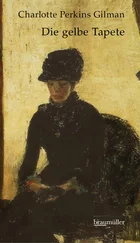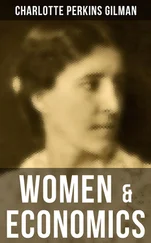Here again was one of the differences between her exquisitely organized people and ours. With them the majority of their interests in life were communal; their love and pride and ambition was almost wholly for the group, even motherhood itself was viewed as social service, and so fulfilled. They were all of them intimately acquainted with their whole history, that was part of their beautiful and easy educational system; with their whole country, and with all its industries.
The children of Herland were taken to all parts of the country, shown all its arts and crafts, taught to honor its achievements and to appreciate its needs and difficulties. They grew up with a deep and vital social consciousness which not one in a thousand of us could approach.
This kind of thing does not show; we could not see it externally, any more than one could see a good housewife's intimate acquaintance with and pride in the last detail of her menage. Further, as our comments on their country had been almost wholly complimentary (they had not heard Terry's!), we had not hurt this national pride; or if we had they had never let us see it.
Now here was Ellador, daring traveler, leaving her world for mine, and finding herself, not as we three had been, exiled into a wisely ordered, peaceful and beautiful place, with the mothering care of that group of enlightened women; but as one alone in a world of which her first glimpse was of hideous war. As one who had never in her life seen worse evil than misunderstanding, or accident, and not much of these; one to whom universal comfort and beauty was the race habit of a thousand years, the sight of Europe in its present condition was far more of a shock than even I had supposed.
She thought that I felt as she did. I did feel badly, and ashamed, but not a thousandth part as she would have felt the exposure of some fault in Herland; not nearly as badly as she supposed.
I was constantly learning from her to notice things among us which I had never seen before, and one of the most conspicuous of my new impressions was the realization of how slightly socialized we are. We are quite indifferent to public evils, for the most part, unless they touch us personally; which is as though the housewife was quite indifferent to having grease on the chairs unless she happened to spoil her own dress with it. Even our "reformers" seem more like such a housewife who should show great excitement over the greasy chairs, but none over the dusty floor, the grimy windows, the empty coal-bin, the bad butter, or the lack of soap. Special evils rouse us, some of us, but as for a clean, sanitary, effortless housekeeping—we have not come to want it—most of us.
But Ellador, lovely, considerate soul that she was, had not only the incessant shock of these new impressions to meet and bear, but was doing her noble best to spare my feelings by not showing hers. She could not bear to blame my sex, to blame my country, or at least my civilization, my world; she did not wish to-cast reproach on me.
I was ashamed, to a considerable degree. If a man has been living in the pleasant atmosphere of perfect housekeeping, such as I have mentioned, and is then precipitated suddenly into foul slovenliness, with noise, confusion and ill-will, he feels it more than if he had remained in such surroundings from the first.
It was the ill-will that counted most. Here again comes the psychic difference between the women of Herland and us. People who grow up amid slang, profanity, obscenity, harsh contradiction and quarrelling, do not particularly note or mind it. But one reared in an atmosphere of the most subtle understanding, gracious courtesy, and a loving use of language as an art, is very sharply impressed if someone says: "Hold yer jaw, yer son of a !," or even by a glowering roomful of silent haters.
That's what was heavy on Ellador all the time,—the atmosphere, the social atmosphere of suspicion, distrust, hatred, of ruthless self-aggrandizement and harsh scorn.
There was a German officer on this ship. He tried to talk to Ellador at first, merely because she was a woman and beautiful. She tried to talk to him, merely because he was a human being a member of a great nation.
But I, watching, saw how soon the clear light of her mind brought out the salient characteristics -of his, and of how, in spite of all her exalted philosophy, she turned shuddering away from him.
We were overhauled by an English vessel before reaching our destination in Sweden, and all three of us were glad to be transferred because we could so reach home sooner. At least that was what we thought. The German officer was not glad, I might add.
Ellador hailed the change with joy. She knew more about England than about the Scandinavian countries, and could speak the language. I think she thought it would be—easier there.
We were unable to get away as soon as we expected. Terry indeed determined to enlist, or to join the service in some way, and they were glad to use him and his aeroplane. This was not to be wondered at. If Terry had the defects of his qualities he also had the qualities of his defects, and he did good work for the Allies.
Ellador, rather unexpectedly asked to stay awhile: "It is hard," she said, "but we may not come again perhaps, and I want to learn all I can."
So we stayed and Ellador learned. It did not take her long. She was a rapid reader, and soon found the right books. She was a marvellous listener, and many were glad to talk to her, and to show her things.
We investigated in London, Manchester, Birmingham; were entertained in beautiful country places; went motoring up into Scotland and in Ireland; visited Wales, and then, to my great surprise, she urged that we go to France.
"I want to see, to know," she said. "To really know ."
I was worried about her. She had a hard-set fixity of expression. Her unfailing gentleness was too firm of surface, and she talked less and less with me about social conditions.
We went to France.
She visited hospitals, looking at those broken men, those mained and blinded boys, and grew paler and harder daily. Day by day she gathered in the new language, till soon she could talk with the people.
Then we ran across Terry, scouting about with his machine; and Ellador asked to be taken up—she wanted to see a battlefield. I tried to dissuade her from this, fearing for her. Even her splendid health seemed shaken by all she had witnessed. But she said: "It is my duty to see and know all I can. This is not, they tell me—exceptional? This—war ?"
"Not at all," said Terry. "It's only bigger than usual, as most things are now. Why, in all our history there have only been about three hundred years without war."
She looked at him, her eyes widening, darkening. "When was that?" she said. "After Jesus came?"
Terry laughed. "Oh no," he said. "It wasn't any one time. It's three hundred years here and there, scattering. So you see war is really the normal condition of human life."
"So," she said. "Then I ought to see it. Take me up, please."
He didn't want to; said it was dangerous; but it was very hard to say no to Ellador, and she had her way. She saw the battle lines of trenches. She saw the dead men; she saw and heard the men not dead, where there had been recent fighting. She saw the ruins, ruins everywhere.
That night she was like a woman of marble, cold, dumb, sitting still by the window where she could rest her eyes on the far stars. She treated me with a great poignant tenderness, as one would treat a beloved friend whose whole family had become lepers.
We went back to England, and she spent the last weeks of our stay there finding out all she could about Belgium.
That was the breaking point. She locked the door of her room, but I heard her sobbing her heart out—Ellador, who had never in all her splendid young life had an experience of pain, and whose consciousness was mainly social. We feel these horrors as happening to other people; she felt them as happening to herself.
Читать дальше












